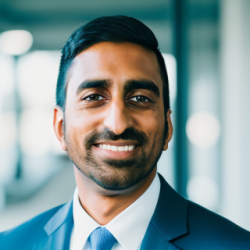I sat outside on my patio eating breakfast leaning back into the chair. Second year of oncology fellowship was over — what a whirlwind. I had learned a lot, but I was exhausted. I had just worked the last 12 days straight and was happy to have a break. I glanced at my phone: three missed calls from my attending. I sprung up from my chair and ran into the house and called him back. I was met with a stern voice, “Why didn’t you tell me about this patient?”
I thought back to the patient I saw the night before: a young man with concern for recurrence of his cancer. I had spoken with the patient and his family, convinced the EM doctors to admit him, talked with another subspecialty team, and asked for further blood work and CT scans, and signed it out to my colleague to follow up on the results the next day.
I could tell he was starting to get annoyed with my silence and raised his voice. “You shouldn’t be making decisions like that without my approval. The subspecialty team called me today, I don’t know anything about the case, and I’m off this weekend.”
“Sorry, I didn’t have enough information to determine a course of action yet and I signed it out to my co-fellow to follow up on the results and staff over the weekend,” I said.
“You are not even a real oncologist! You can’t be making these decisions! You have no idea what you are even talking about! I will be making sure there are repercussions for your actions here and will be reporting you to your program director,” he yelled.
His words hit me like a gut punch. Had I made a major error? Was the patient OK? Was he going to try to get me kicked out? I was scared, threatened, and humiliated all at the same time. Millions of thoughts raced into my head as he continued to barrage me with comments that belittled me, attacked my personal character, and made sure I knew what I did was wrong. This guy, I thought to myself, is going to try to end my career.
I struggled over the next few weeks. I noticed myself becoming more anxious over simple decisions. I was triple-checking my work and doubting my abilities at every turn. I also was in the middle of looking for my first attending job, starting as a chief for our fellowship program, supporting my pregnant wife, and expecting our first child. I was stressed to say the least. I couldn’t sleep without my mind racing and replaying the scenario repeatedly. My stomach would tighten up in a ball and I would develop chest pain that would last for minutes at time. I just wasn’t myself and I couldn’t let go of how I was treated. I sent a strongly worded and passionate email to the leaders of the department and met with many of them in person. Most people were supportive of my stance and agreed such behavior was unacceptable. But after meeting and listening to me once, I never really heard from them again. I was being appeased and once I was heard then it was like it never happened. Was I sabotaging my own career? Should I just let this go and fall in line?
Thankfully, after speaking with other fellows and my close mentors, I knew I wasn’t alone. They listened and offered their support, checking in with me periodically — something very few people had done up until this point. They lifted me up as I struggled with anxiety over the issue. As I spoke with more people over the months, I learned that this certain attending’s behavior was not limited to just myself. Many others came to me reporting similar experiences of the same belittling, accusatory, and aggressive behavior. These individuals were not just fellows, but nurses, social workers, pharmacists, and other attendings. How could someone be given so many chances for the same repeated behavior? As I rose into a chief fellow role, I made it a priority to protect my co-fellows and other trainees. I created an anonymous feedback tool on our fellowship website to report any program or faculty professionalism concerns, and we had monthly meetings with our co-fellows to discuss concerns in a protected, anonymous manner. After a few months of documented incidents from other individuals, I re-submitted a compilation of complaints to our leadership. They listened. A few weeks later, this attending was pulled from teaching services until he underwent a remediation program on how to properly work with trainees.
My advice for those who have gone through a similar situation is to advocate for yourself and your peers and don’t be afraid to keep trying. There are many individuals like the attending that verbally abused and harassed me that exist in medicine. Many of us as trainees are afraid to face repercussions of bringing up our own concerns regarding an attending’s behavior and creating “awkwardness” in our own programs, leadership, and institutions. Many of us want to stand up for what’s right, but don’t know the exact avenues of where and who to talk to and sometimes it is easier to “grin and bear it.” I am lucky to have mentors, co-fellows, friends, and family that stand by me in tough times, but it takes a village to change the culture of a specialty, training program, or even a hospital. As we shed more light on the true challenges we face as trainees, the more we can work together to identify solutions to better medical trainee learning environments. Every trainee deserves a safe training environment, where they are allowed to question, learn, practice, and voice their concerns without fear of retaliation.
Illustration by Jennifer Bogartz
Dr. Matthew Kurian is the chief hematology/oncology fellow at University Hospitals, Case Comprehensive Cancer Center. Dr. Kurian is also enrolled in Doximity's Digital Health Fellowship as a first-year fellow. His Twitter is @MatthewKurianMD and he is on Instagram at @Mkurry92.







